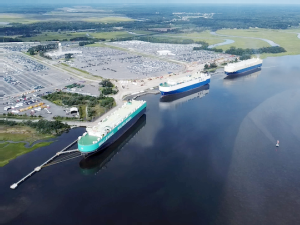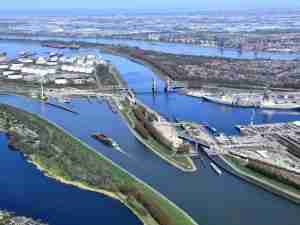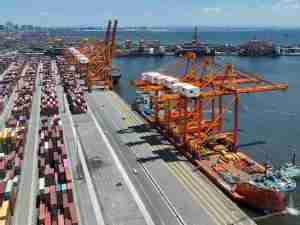Phillips 66 says evaluating condensate export process, seeking clarity
By: Reuters | Aug 14 2014 at 02:49 PM | Ports & Terminals
Independent refiner Phillips 66 said it is evaluating the export of super-light crude oil known as condensate, after two industry peers received U.S. government approval to ship it overseas after minimal processing.
The company declined to say if it has sought formal permission to export condensate from the U.S. Department of Commerce, which is tasked with interpreting exceptions to a decades-old ban on crude exports.
"We're evaluating the process and seeking a better understanding," Chris Chandler, Phillips 66's head of natural gas liquids (NGLs) said. "That process is still a little unclear to us."
He spoke before the groundbreaking for the construction of a 100,000 barrel per day (bpd) fractionation plant that strips NGLs from gas and a liquified petroleum gas (LPG) export facility that will require $3 billion in investments.
The facility in Freeport, Texas will sit near the Gulf Coast and is close to the company's 247,000 bpd refinery in Sweeny, which has a link to Kinder Morgan's Crude and Condensate pipeline, a 300,000 bpd line that moves crude from the Eagle Ford fields to Houston.
The terminal after start up in 2016 will provide 4.4 million barrels per month of export capacity for LPGs, which include butane and propane.
Asked if the export facility could potentially export condensate that has been minimally processed, Chandler said: "This Freeport facility has a lot of expansion possibilities. It's close to the Gulf of Mexico, three miles from open water. We have the capability of doing a lot more here than we do currently."
Chief Executive Greg Garland, while cautioning further plans are still being weighed, said the company could end up spending more on energy infrastructure on the Gulf Coast.
"We're thinking of $10 billion in projects right here on the Gulf Coast," he said.
Demand is growing for new facilities to handle surging output of oil and gas from the U.S. shale boom.
That output has prompted a rise in exports of refined products and led to calls for a loosening of the ban on crude exports, especially because local refiners have limited capacity to run lighter crudes coming out of shale fields.
"In the not too distant future we need to export crude. We are long light sweet crude in Texas," Texas Railroad Commissioner Barry Smitherman, the state's top energy regulator, said.
In June, Commerce told Pioneer Natural Resources and Enterprise Product Partners they could export stabilized condensate as a refined product without a special license, which is needed to export unprocessed domestic crude.
U.S. law has long defined processed oil as having passed through distillation towers, key pieces of refinery equipment that turn crude oil into finished products.
But the Commerce Department said equipment known as stabilizers, traditionally used to treat crude so it meets pipeline specifications, could also be used to comply with the refining regulation. (Reuters)










